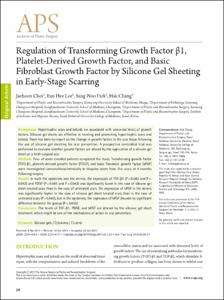KUMEL Repository
1. Journal Papers (연구논문)
1. School of Medicine (의과대학)
Dept. of Plastic Surgery (성형외과학)
Regulation of Transforming Growth Factor β1, Platelet-Derived Growth Factor, and Basic Fibroblast Growth Factor by Silicone Gel Sheeting in Early-Stage Scarring
- Keimyung Author(s)
- Choi, Jae Hoon
- Department
- Dept. of Plastic Surgery (성형외과학)
- Journal Title
- Archives of Plastic Surgery
- Issued Date
- 2015
- Volume
- 42
- Issue
- 1
- Abstract
- Background Hypertrophic scars and keloids are associated with abnormal levels of growth
factors. Silicone gel sheets are effective in treating and preventing hypertrophic scars and
keloids. There has been no report on the change in growth factors in the scar tissue following
the use of silicone gel sheeting for scar prevention. A prospective controlled trial was
performed to evaluate whether growth factors are altered by the application of a silicone gel
sheet on a fresh surgical scar.
Methods Four of seven enrolled patients completed the study. Transforming growth factor
(TGF)-β1, platelet-derived growth factor (PDGF), and basic fibroblast growth factor (bFGF)
were investigated immunohistochemically in biopsies taken from five scars at 4 months
following surgery.
Results In both the epidermis and the dermis, the expression of TGF-β1 (P=0.042 and P=
0.042) and PDGF (P=0.043 and P=0.042) was significantly lower in the case of silicone gel
sheet-treated scars than in the case of untreated scars. The expression of bFGF in the dermis
was significantly higher in the case of silicone gel sheet-treated scars than in the case of
untreated scars (P=0.042), but in the epidermis, the expression of bFGF showed no significant
difference between the groups (P=0.655).
Conclusions The levels of TGF-β1, PDGF, and bFGF are altered by the silicone gel sheet
treatment, which might be one of the mechanisms of action in scar prevention.
Keywords Silicone gels / Cytokines / Cicatrix
- Keimyung Author(s)(Kor)
- 최재훈
- Publisher
- School of Medicine
- Citation
- Jaehoon Choi et al. (2015). Regulation of Transforming Growth Factor β1, Platelet-Derived Growth Factor, and Basic Fibroblast Growth Factor by Silicone Gel Sheeting in Early-Stage Scarring. Archives of Plastic Surgery, 42(1), 20–7. doi: 10.5999/aps.2015.42.1.20
- Type
- Article
- ISSN
- 2234-6163
- Appears in Collections:
- 1. School of Medicine (의과대학) > Dept. of Plastic Surgery (성형외과학)
- 파일 목록
-
-
Download
 oak-aaa-00409.pdf
기타 데이터 / 4.42 MB / Adobe PDF
oak-aaa-00409.pdf
기타 데이터 / 4.42 MB / Adobe PDF
-
Items in Repository are protected by copyright, with all rights reserved, unless otherwise indicated.